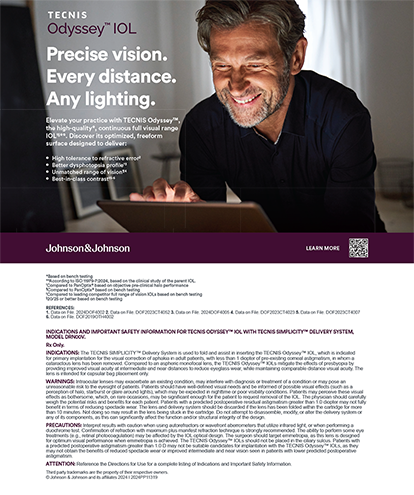
Refractive procedures such as LASIK, PRK, and refractive lens exchange (RLE) are not usually covered by health insurance because surgery is typically performed to reduce or eliminate the patient’s need for eyeglasses (ie, elective cosmetic surgery). Exceptions to the general principle of noncoverage include eye surgery for the following refractive errors:
- Caused by an injury;
- A result of surgery;
- Severe in nature (the meaning of severe is not well defined); and
- An inability to wear glasses or contact lenses due to physical limitations (eg, allergy or deformity and lens intolerance, respectively).1
Although these situations are uncommon, it is important to appreciate that not usually covered is distinctly different from never covered. Even Medicare has rules to cover the correction of a surgical complication.2 Current Procedural Terminology lists 65772 to report “corneal relaxing incisions for correction of surgically induced astigmatism” and 65775 to report “corneal wedge resection for correction of surgically induced astigmatism.”3,4 A Medicare local coverage policy explicitly covers lens extraction for “intolerable anisometropia or aniseikonia uncorrectable with glasses or contact lenses that exists as a result of lens extraction in the first eye.”5 The policy does not specify the amount of lens opacity that qualifies for lens extraction in the second eye.
HEALTH CARE BENEFITS AND REFRACTIVE SURGERY
Some insurance plans incorporate benefits for laser vision correction that reduce the cost via discounts from in-network surgeons.6-8 Certain Medicare Advantage plans include refractive cataract surgery as a benefit, although traditional Medicare does not. Consequently, billers and coders are advised to check the policies of the patient’s insurance plan instead of assuming that refractive surgery is outside the boundaries of coverage and payment.9
A written agreement should be part of any practice’s administrative procedure and reviewed with the patient before any surgery that requires payment for a presumed noncovered service. These financial waivers can take many forms: Advance Beneficiary Notice of Noncoverage (Part B Medicare), Notice of Exclusion from Health Plan Benefits (commercial plans), and predetermination of benefits (Medicare Advantage). No single financial waiver form works for all payors.
LASIK ALTERNATIVES
LASIK is synonymous with refractive surgery.10 When this form of surgery is contraindicated, alternative refractive procedures may be considered.11 Poor candidates for LASIK include patients with the following:
- An unstable refractive error;
- An extreme amount of myopia, hyperopia, or astigmatism;
- Severe dry eye disease;
- Inadequate corneal thickness;
- Corneal scarring or disease;
- Keratoconus;
- Advanced glaucoma;
- Cataract affecting vision;
- A history of certain eye infections; and
- Uncontrolled diabetes.
Pregnant women, moreover, are advised not to undergo LASIK.
RLE can be an attractive option for individuals with presbyopia, those whose refractive error is beyond what is correctable by LASIK, and those older than 50 years of age.12 Because RLE and cataract surgery are performed with similar surgical techniques, RLE is faster and simpler for cataract surgeons to adopt than corneal procedures. The diagnostic and surgical instruments used in RLE and cataract surgery are also the same, so no additional capital investment is required. Advanced technology IOLs that can correct presbyopia and astigmatism are additional benefits of RLE.
CONCLUSION
Without the upper limits on professional fees imposed by the assignment provisions of insurance contracts, noncovered refractive surgery of all types can be financially attractive to ophthalmic practices.
Given current reimbursement, some surgeons may feel that performing routine cataract surgery with a standard monofocal IOL on Medicare beneficiaries is not worth their time.13 This view is problematic for legal and ethical reasons. It also points, however, to a financial problem for ophthalmologists and provides one reason why refractive surgery—alone or in combination with medically necessary cataract surgery—may be appealing. From this perspective, noncovered refractive surgery helps support covered care for insured patients.
1. WebMD editorial contributors. Health insurance and refractive or laser eye surgery. WebMD. March 4, 2022. Accessed September 15, 2023. https://www.webmd.com/eye-health/does-insurance-cover-costs-refractive-laser-eye-surgery
2. Chapter 12, section 40.1B. Medicare Claims Processing Manual. Centers for Medicare & Medicaid Services. Accessed September 15, 2023. https://www.cms.gov/Regulations-and-Guidance/Guidance/Manuals/Downloads/clm104c12.pdf
3. CPT 2023 Professional Edition. American Medical Association; 2023.
4. Ophthalmology coding alert: diagnosis coding is key to payments for 65772 or 65775. Codify by AAPC. January 1, 2001. Accessed September 15, 2023. https://www.aapc.com/codes/coding-newsletters/my-ophthalmology-coding-alert/diagnosis-coding-is-key-to-payments-for-65772-or-65775-article
5. Local coverage determination (LCD) cataract surgery L34413. Centers for Medicare & Medicaid Services. Accessed September 15, 2023. https://www.cms.gov/medicare-coverage-database/view/lcd.aspx?LCDId=34413
6. Booth J. Is LASIK covered by insurance? Forbes Health. Updated September 12, 2023. Accessed September 15, 2023. https://www.forbes.com/health/body/is-lasik-covered-by-insurance/#:~:text=Because%20LASIK%20is%20an%20elective,who%20are%20interested%20in%20LASIK
7. Does insurance cover LASIK? Humana. Accessed September 15, 2023. https://www.humana.com/vision-insurance/vision-resources/does-insurance-cover-lasik-eye-surgery
8. Guinan S. Is LASIK covered by my health insurance? ValuePenguin. Updated June 16, 2023. Accessed September 15, 2023. https://www.valuepenguin.com/lasik-coverage-health-insurance
9. Does insurance cover LASIK? The update for 2023. Refractive Surgery Council. Updated September 8, 2023. Accessed September 15, 2023. https://americanrefractivesurgerycouncil.org/does-insurance-cover-lasik/
10. Boyd K. LASIK – laser eye surgery. AAO EyeSmart. July 26, 2023. Accessed September 15, 2023. https://www.aao.org/eye-health/treatments/lasik
11. Turbert D. Alternative refractive surgery procedures. AAO EyeSmart. April 25, 2023. Accessed September 15, 2023. https://www.aao.org/eye-health/treatments/refractive-surgery-alternative-procedures
12. Stephenson M. A review of refractive lens exchange. Review of Ophthalmology. November 10, 2022. Accessed September 15, 2023. https://www.reviewofophthalmology.com/article/a-review-of-refractive-lens-exchange
13. Burke MP, Glasser DB, Pelton RW, Repka MX, Siegfried CJ, Woodke J. “It’s not worth my time!”—the ethical and legal aspects of physician-induced demand. EyeNet Magazine. June 2023. Accessed September 15, 2023. https://www.aao.org/eyenet/article/physician-induced-demand




